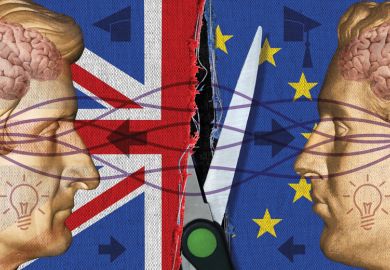All our EU Referendum results coverage in one place
A spectre is haunting Europe – the spectre of an independent Britain.
From a Scottish perspective the European referendum seemed to unfold at a distance. In the wake of the 2014 independence referendum and the ground-changing general election when Labour was effectively wiped out in Scotland, intense political debate has become the norm north of the border, especially through social media.
In England, things are different. Labour is still visible. The Tories are deeply split. There is no equivalent of the Scottish National Party (SNP), a left-of-centre party with a strong pro-Europe stance. The European referendum was dominated in England by the issue of immigration, which assumed a particularly racist dimension. Not in Scotland. Neither campaign spent much time in Scotland. For Leave, Scotland was deemed to be a lost cause, and for Remain, a battle already won.
Many pro-European Scots who are pro-independence recognise the paradox that a narrow vote for Brexit that was significantly opposed in Scotland could trigger a second referendum, ushering in independence earlier than anticipated. Voting for one thing while wishing for another is always a risky business.
A narrow Remain vote, sustained by Scotland, would have sent a message to the Great Brits and Little Englanders of the Leave campaign that the sovereignty they seek will never happen while Scotland is their good European conscience. Today’s outcome is the “Breaking Bad” scenario as a terminal Britain struggles to be great again, forgetting that its greatness was based on the very inequalities it blames on foreigners.
From a historical standpoint, the coming together of the four nations forming the British state marked a turning-away from Europe. When Francis Bacon wrote on Anglo-Scottish union 400 years ago, a union whose first fruits included the plantation of Ulster, he argued that England was like a tortoise, safe within its shell but vulnerable if it poked its head out. The shell was Ireland, Scotland and Wales, the protective covering that kept Europe at bay.
The British project from its beginnings was a fundamentally anti-European enterprise. Even as a full member of the EU, Britain has kept its distance, trying to cut a deal whenever progressive policies threatened its conservative social agenda. This half-in, half-out status, together with the legacy of empire and the special relationship with the US, meant Britain resisted any notion of a federal Europe, a United States of Europe, warding off the prospect of ever-closer union.
We are not facing the end of the European Union, but rather the break-up of Britain.
Although the Scottish referendum did not deliver independence, it dealt a death blow to Scottish Labour, whose Unionist stance cost it dearly. This seismic shift in Scottish politics suggests independence is coming, sooner or later. We will be taking our country back again – but in a forward-looking way.
Many Scots like myself would prefer not to be “Breaking Bad” – we want an amicable separation. I would like to see an independent England live up to the ideals of its best thinkers, writers and citizens. At present there has not been the open and informed political debate in England that we have had in Scotland. Sadly, parts of England seem ripe for the reactionary politics one associates with Donald Trump.
Blaming immigrants for the parlous condition of the NHS or for unemployment and poverty is lazy and dishonest, but it’s how the British media portrays things. Expert opinion is all too easily overlooked.
My own university, part of a great European history, broke with tradition by taking a position on this referendum. Unlike Scottish independence, where the university remained neutral while encouraging free and rigorous debate, on the EU referendum my institution considered the prospect of Brexit so potentially damaging that it had to take a public position. As the Times Higher Education survey showed, 90 per cent of university staff questioned were in favour of Remain. Who was listening?
Higher education matters more than ever. We need genuine research-informed policy and an informed media, more impact and public engagement, and we need to extend our reach. I have a passionate commitment to widening participation as an adult returner myself. Perhaps the disconnect we are witnessing between Nobel prizewinning economists and scientists on the one hand, and voters in working-class heartlands on the other, should urge us to make sure that no one is left behind when it comes to access or opportunity.
There has been a “Left” case for Brexit for some time, including the vociferous Euroscepticism of the late Tony Benn and more recently Dennis Skinner. The British Left has a long tradition of putting Britain first, but we may well be witnessing the last of Britain.
The UK has taken leave of its senses. We can no longer look across the pond at Trump’s America and say it can’t happen here. Right-wing populism has taken root on this side of the Atlantic and it will take hard work to persuade people that fear of foreigners and hankering after outmoded notions of empire gets us nowhere. Scotland can be proud of preserving the European connection and asserting its own Enlightenment values over its misguided southern neighbour.
Is Britain really “Better Together” – or falling apart? One thing is certain: Britain will never be the same. It has lost its memory; it may soon lose its name.
I belong to Glasgow, and Glasgow voted to remain open to Europe and welcoming to others. My country voted to remain. Its dominant neighbour within the British union decided otherwise. The old SNP slogan of “Independence within Europe” will come back to haunt the Brexiters. Far from making Britain great again, they will be left in a Little England all at sea.
Willy Maley is professor of Renaissance studies at the University of Glasgow.
Register to continue
Why register?
- Registration is free and only takes a moment
- Once registered, you can read 3 articles a month
- Sign up for our newsletter
Subscribe
Or subscribe for unlimited access to:
- Unlimited access to news, views, insights & reviews
- Digital editions
- Digital access to THE’s university and college rankings analysis
Already registered or a current subscriber?










